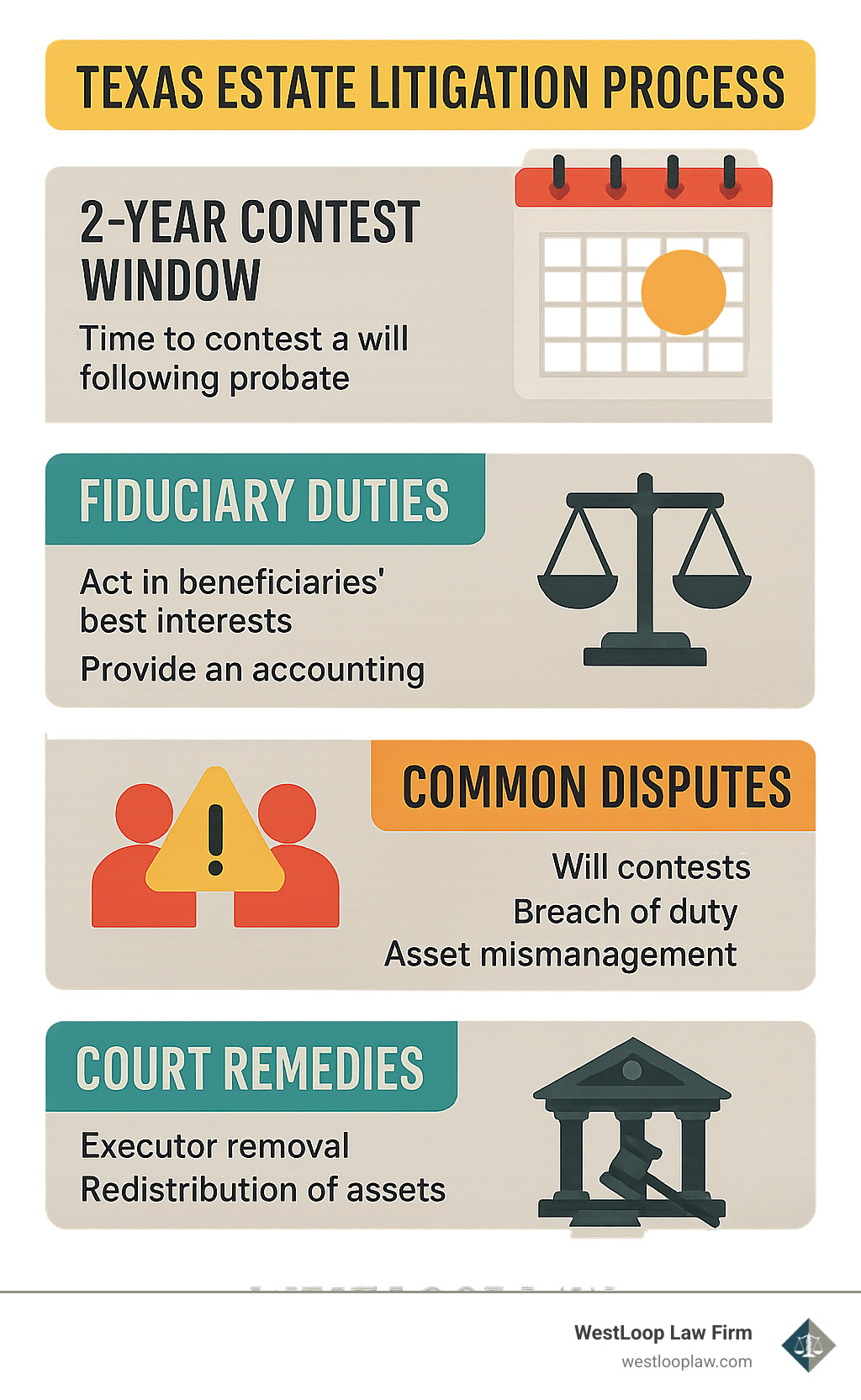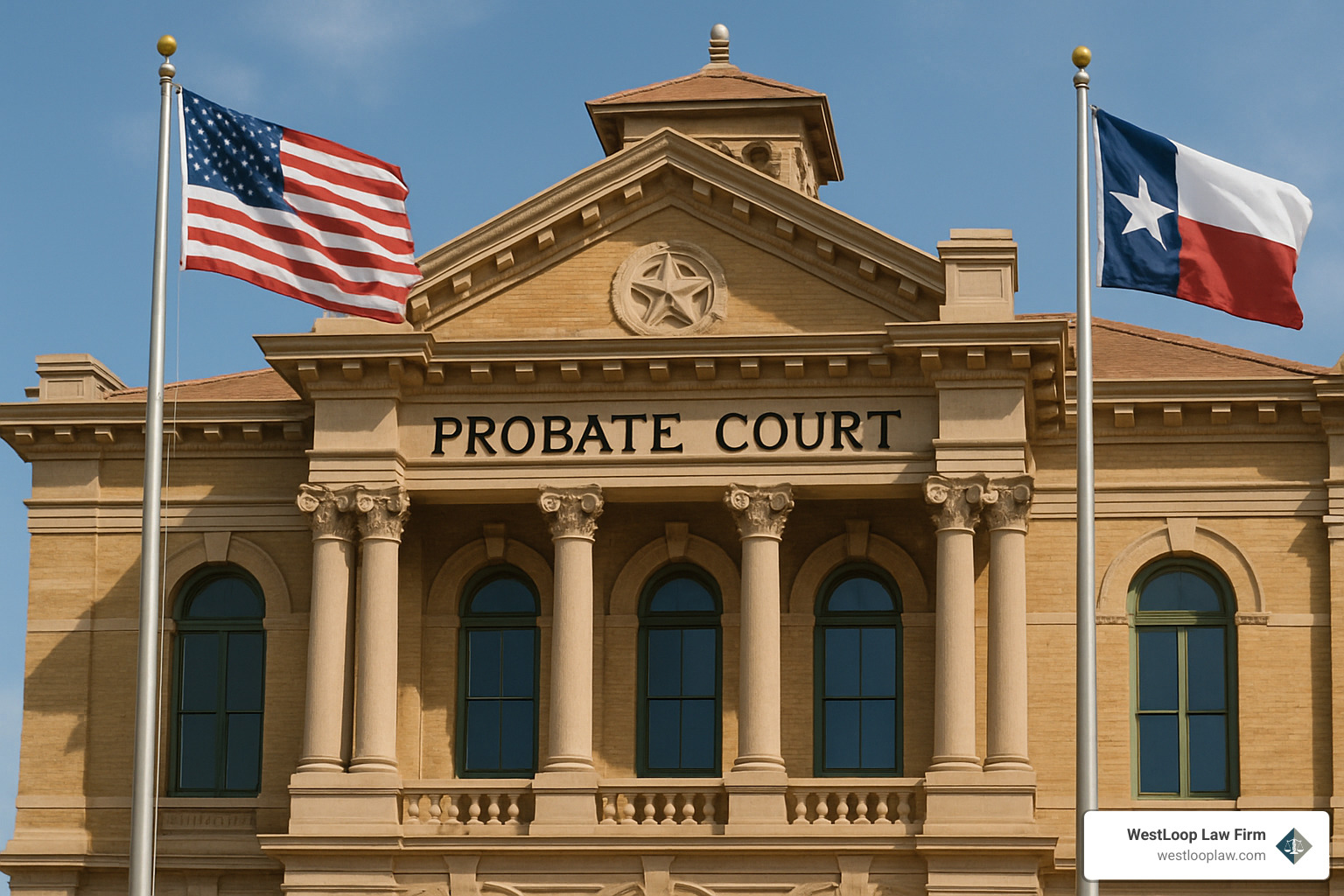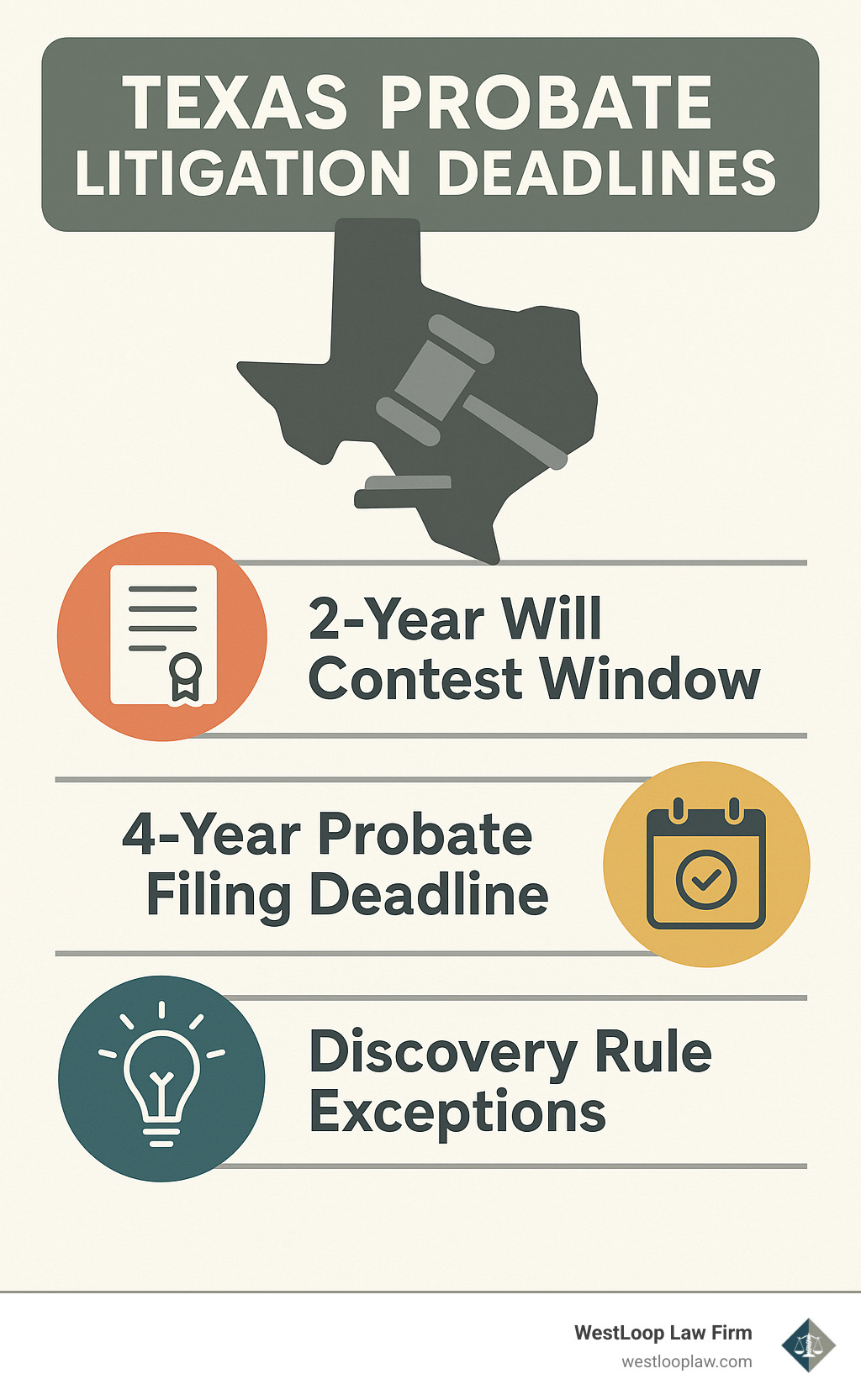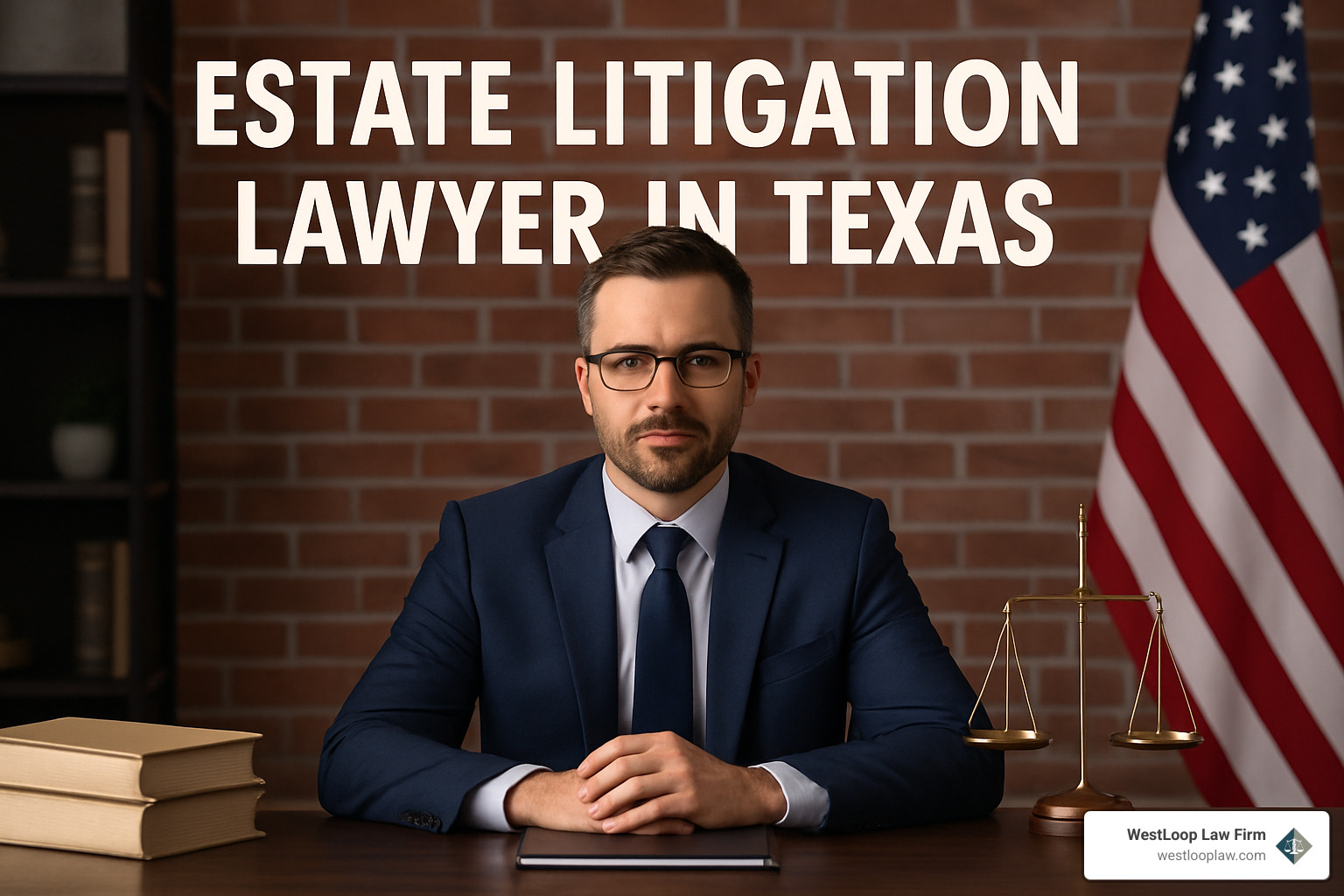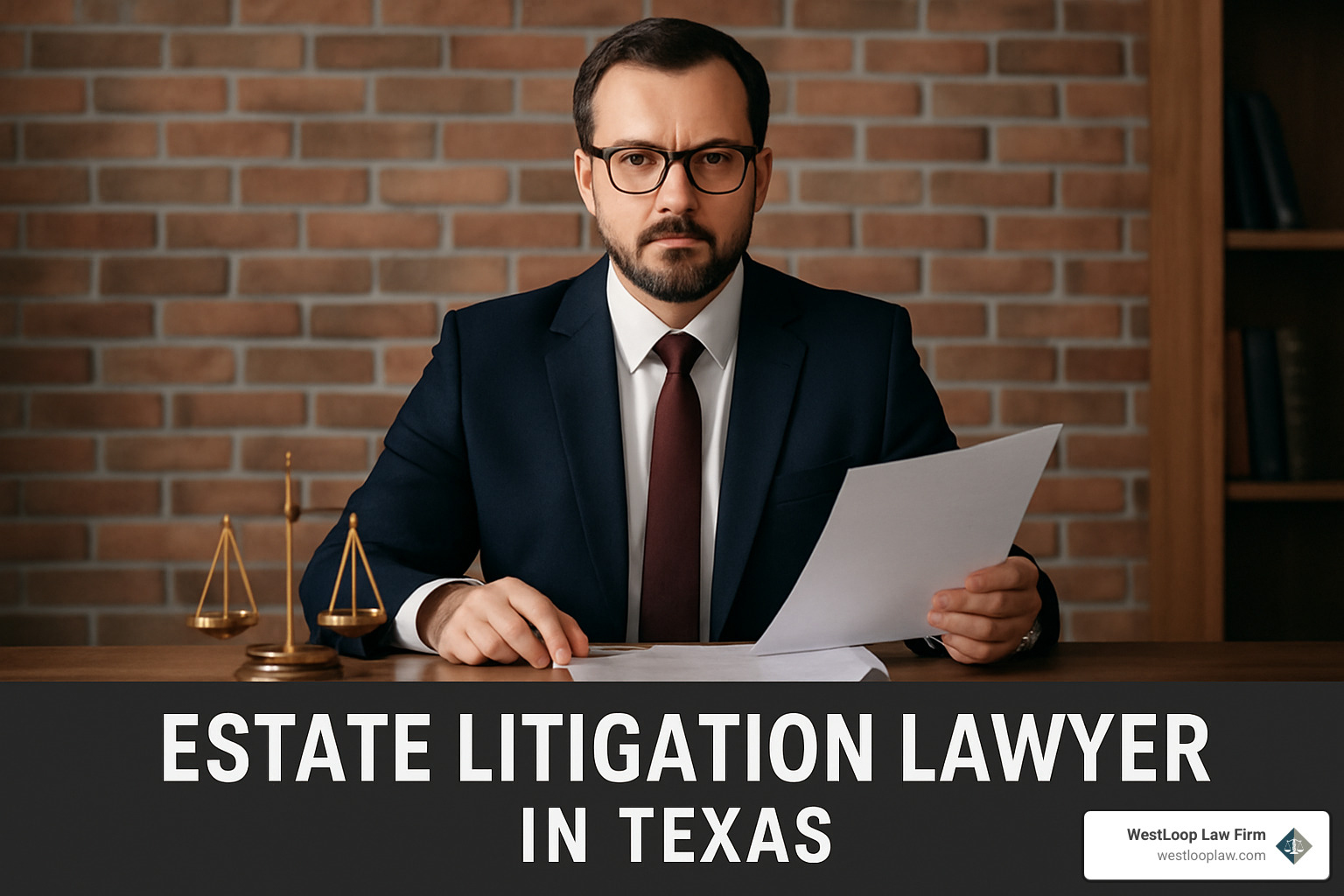Protecting Your Inheritance Rights in Texas
If you’re looking for an estate litigation lawyer in Texas, here’s what you need to know:
- When to hire: When facing will contests, trust disputes, executor misconduct, or inheritance theft
- Time limits: 2 years to contest a will after probate filing; 4 years to offer a will for probate after death
- Cost: Many firms offer free consultations; some accept contingency fees for certain cases
- What to look for: Board certification in Estate Planning and Probate Law, local court experience, and trial record
Estate disputes can tear families apart at the worst possible time. When a loved one passes away, grief is complicated enough without adding legal battles over their assets. Unfortunately, inheritance conflicts are increasingly common in Texas, especially with blended families, significant assets like oil and gas rights, or when someone suspects executor misconduct.
Texas probate courts handle thousands of estate disputes annually, ranging from will contests to breach of fiduciary duty claims. These cases require specialized legal knowledge that goes beyond regular estate planning or uncontested probate work.
As Jack Lawter, a veteran estate litigator puts it: “Most estate planning attorneys never engage in litigation of any kind.” This critical difference means you need an attorney with courtroom experience when inheritance is on the line.
In Texas, beneficiaries have specific rights—including requesting formal accountings and challenging executors who fail to distribute assets in a reasonable timeframe. But these rights must be exercised promptly, as the law imposes strict deadlines.
Whether you’re protecting your rightful inheritance or defending against unfounded claims, choosing the right estate litigation attorney can make all the difference in preserving family wealth and relationships.
Estate litigation lawyer in texas glossary:
– Probate court Houston Texas
– estate law attorney near me
– probate challenge lawyer houston tx
What Is Estate Litigation (and How It Differs From Estate Planning or Uncontested Probate)?
When a loved one passes away, most families hope for a smooth transition of assets. But sometimes, disputes arise that transform what should be a straightforward process into a complex legal battle. This is where estate litigation lawyers in Texas come into the picture.
Estate litigation involves contested legal matters related to a deceased person’s estate, trusts, or guardianship. It’s fundamentally different from estate planning, which happens before death and focuses on creating wills and trusts. It also differs from uncontested probate, where everyone agrees on how to handle the estate.
Think of it this way: estate planning is like drawing up the blueprints for a house, uncontested probate is building that house according to plan, but estate litigation happens when people disagree about whether the blueprints were valid or if the builder followed them correctly.
In Texas, these disputes typically center around several key issues:
Will contests often arise when family members question whether a will truly represents the deceased’s wishes. These challenges usually involve claims of undue influence (someone improperly pressured the deceased), lack of testamentary capacity (the person wasn’t mentally able to understand what they were doing), fraud, or improper execution.
Trust disputes can emerge when beneficiaries disagree about how a trust should be interpreted or when they believe a trustee isn’t managing assets properly.
Breach-of-fiduciary-duty claims occur when executors, administrators, or trustees fail to uphold their legal obligations to act in others’ best interests.
The Texas Estates Code provides the legal framework for these matters, with specific provisions covering everything from will contests to executor removal. You can find the official statutes at the Texas laws Probate website.
As one seasoned probate attorney told me: “Estate planning is about creating roadmaps, while estate litigation is about what happens when people argue over which road to take—or whether the map is even legitimate.”
When intestacy (dying without a will) occurs, Texas law determines who inherits what. This often leads to contests among potential heirs who may have different interpretations of these laws.
For a deeper understanding of the normal probate process that litigation disrupts, check out this guide to probate steps.
Key Terminology Every Texan Should Know
Before diving deeper into the complexities of estate litigation, let’s clarify some terms you’ll encounter throughout the process:
Executors are individuals named in a will to carry out its instructions. They’re responsible for gathering assets, paying debts, and distributing what remains to the beneficiaries.
Administrators serve a similar function but are appointed by the court when there’s no will or when the named executor can’t or won’t serve.
Trustees manage assets held in trust for the benefit of others, following the trust document’s instructions while upholding strict fiduciary duties.
Beneficiaries are the people designated to receive assets from a will, trust, or other instrument. Their rights include receiving information about the estate and, in many cases, requesting accountings.
In Texas, these roles carry significant responsibilities. Executors and trustees owe beneficiaries the highest degree of loyalty and care. They must avoid conflicts of interest, provide full disclosure, and maintain proper records. When these duties are breached, beneficiaries have the right to seek justice through probate courts.
Understanding these terms isn’t just about legal jargon—it’s about knowing your rights and responsibilities in what can be an emotionally charged process. Whether you’re an executor being challenged or a beneficiary questioning how an estate is being handled, having the right legal guidance can make all the difference in protecting what matters most.
When & Why to Hire an Estate Litigation Lawyer in Texas
Family disputes over inheritance can be both emotionally draining and legally complex. Knowing exactly when to call in professional help can save you countless headaches, preserve family relationships, and protect what’s rightfully yours.
When should you reach out to an estate litigation lawyer in Texas? The answer often comes down to recognizing when something just doesn’t feel right about how an estate is being handled.
If you suspect a loved one was pressured into changing their will during a vulnerable time, you’re not alone. We regularly see cases where elderly parents make dramatic last-minute changes to estate plans while experiencing health challenges. This potential undue influence requires immediate legal attention.
Fiduciary misconduct is another common trigger for seeking help. When executors or trustees start avoiding your calls, refuse to provide financial statements, or seem to be treating the estate like their personal piggy bank, these are serious red flags.
Texas estates with valuable or complex assets often benefit from specialized legal representation. Oil and gas properties, mineral rights, family businesses, and substantial real estate holdings require particular expertise to properly value and distribute. An estate litigation lawyer in Texas familiar with these assets can ensure nothing falls through the cracks.
Blended family situations frequently create inheritance tensions. When stepparents and step-siblings have competing interests, having your own advocate becomes essential. These delicate situations require both legal knowledge and interpersonal skill to steer successfully.
Guardianship disputes, mysteriously “missing” assets, and confusing or contradictory estate documents all warrant professional legal guidance. At WestLoop Law Firm, we’ve helped numerous Houston families tackle these exact challenges.
The good news? Many qualified attorneys offer free consultations to evaluate your situation. Some even work on contingency for certain cases with significant assets or clear misconduct, meaning you only pay if they recover assets for you.
Signs You Need an estate litigation lawyer in texas
Trust your instincts. If something about an estate administration feels wrong, it probably is. Here are the warning signs we see most often:
When executors keep saying “we’re almost done” for months or even years, that’s a problem. Probate shouldn’t take forever. Unexplained delays often mask deeper issues.
Has the executor stopped returning your calls or emails? Do they get defensive when you ask reasonable questions? This communication breakdown frequently precedes more serious problems.
Texas law requires proper accounting of estate assets, yet many executors fail to provide these essential reports. If you can’t get clear financial information, it’s time to consult a professional.
Pay attention to unusual financial moves. Large withdrawals, property transfers to people not named in the will, or questionable “expenses” deserve scrutiny. One client finded her brother had been writing himself “executor fee” checks monthly that totaled more than the entire estate was worth!
Last-minute changes to wills or trusts, especially when made during illness or vulnerability, raise serious legal questions. Similarly, when executors seem to benefit personally from their position or show obvious favoritism among beneficiaries, legal intervention may be necessary.
One particularly poignant case involved a daughter who finded family heirlooms—items specifically promised to her in her mother’s will—had vanished before the estate inventory was filed. Her brother claimed no knowledge of their whereabouts, yet photos on social media told a different story. These situations require immediate legal help.
Statutes of Limitations Every estate litigation lawyer in texas Knows
Time is truly of the essence in estate matters. Texas law establishes strict deadlines that, if missed, can permanently bar your claims:
You have just two years after a will is admitted to probate to contest it—regardless of how strong your evidence might be. This clock starts ticking the moment the probate court approves the will.
Families must generally offer a will for probate within four years of their loved one’s death. Wait too long, and the court may not accept it at all.
Claims for breach of fiduciary duty typically must be brought within four years from when the breach occurred or was finded. The same timeline applies to most fraud claims related to estates.
Trust contests generally face a four-year deadline from when you finded (or reasonably should have finded) the grounds for contesting.
While some exceptions exist—like when fraud is finded later or when the claimant is a minor—it’s always wisest to act promptly rather than hoping for an exception. The strongest cases can be lost forever simply because someone waited too long to take action.
Remember: protecting your inheritance rights starts with recognizing when something’s wrong and getting qualified help before time runs out.
The Texas Estate Litigation Roadmap: From Investigation to Trial or Settlement
Wondering what to expect when you’re facing an estate dispute in Texas? Let me walk you through the journey from start to finish – knowing what’s ahead can help ease some of the anxiety that naturally comes with these emotionally charged cases.
Most estate litigation follows a path that might feel long and winding, but has predictable landmarks along the way:
First, your estate litigation lawyer in Texas will conduct a thorough investigation – reviewing wills, trusts, financial records, and other documents to understand what’s really going on. This detective work lays the foundation for everything that follows.
Before heading to court, many attorneys will attempt to resolve matters through strongly worded demand letters and negotiations. Why? Because even the “winner” in protracted litigation often feels like they’ve lost something – time, money, and family relationships.
If early negotiations don’t bear fruit, your attorney will file formal pleadings with the appropriate probate court. This officially kicks off the litigation process. In urgent situations – like when someone’s draining estate accounts or selling property that should be preserved – we can ask for temporary restraining orders to freeze assets until the court sorts things out.
The findy phase (what lawyers call “findy”) follows, where both sides exchange information through document requests, written questions, and recorded testimony. This is often where the truth emerges – sometimes revealing smoking guns that can dramatically change the case’s direction.
Complex cases frequently require expert witnesses – perhaps a forensic accountant to trace missing funds, a medical professional to testify about mental capacity, or a document examiner to analyze suspicious signatures. These experts can make or break your case.
Before heading to trial, Texas courts typically require mediation – a structured negotiation with a neutral third party helping both sides find common ground. At WestLoop Law, we’ve seen seemingly intractable disputes resolve surprisingly well during mediation, sparing families the emotional and financial cost of a trial.
If mediation doesn’t succeed, we prepare for trial – organizing evidence, preparing witnesses, and crafting compelling arguments. The case is then presented to either a judge or jury who renders a decision. Dissatisfied parties can appeal unfavorable rulings to higher courts, though this extends the timeline considerably.
Here’s how different estate proceedings typically compare:
| Feature | Uncontested Probate | Contested Probate | Trust Litigation |
|---|---|---|---|
| Typical Duration | 6-12 months | 1-3+ years | 1-3+ years |
| Court Involvement | Minimal | Extensive | Extensive |
| Findy Required | Minimal | Extensive | Extensive |
| Expert Witnesses | Rarely needed | Often required | Often required |
| Mediation | Not required | Typically required | Typically required |
| Attorney Fees | Lower ($3-8K) | Higher ($20K-$100K+) | Higher ($20K-$100K+) |
| Attorney Fee Structure | Usually flat fee | Usually hourly | Hourly or contingency |
Remedies Texas Courts Can Order
Texas probate courts have impressive authority to right wrongs in estate matters. When misconduct is proven, the court can order powerful remedies that include:
Executor removal is perhaps the most common – replacing fiduciaries who’ve breached their duties with someone trustworthy. The court can also order asset recovery, forcing the return of improperly taken property to the estate where it belongs.
When financial shenanigans are suspected, courts often order detailed accountings, making fiduciaries explain every penny that’s passed through their hands. For serious breaches, courts can impose surcharge damages, making the wrongdoer personally liable for losses they caused.
In cases of self-dealing, courts may order disgorgement – forcing people to surrender profits from their improper actions. They can create constructive trusts to prevent unjust enrichment, and in particularly egregious cases, award punitive damages as additional monetary penalties.
I recently worked with a client whose brother had used their father’s estate funds to renovate his personal home. The court not only removed him as executor but ordered full repayment with interest and awarded our attorney fees. The message was clear: Texas courts take fiduciary duties seriously.
Whether your case involves document interpretation issues or outright theft, an experienced estate litigation lawyer in Texas can help you steer this complex process and fight for the remedies you deserve.
How to Evaluate and Choose the Right Attorney
Finding the perfect estate litigation lawyer in Texas feels a bit like dating – you need someone with the right credentials, experience, and personality who just “clicks” with your situation. This decision can make or break your case, so let’s break down what truly matters.
Board certification from the Texas Board of Legal Specialization isn’t just another fancy certificate on the wall – it represents specialized knowledge that’s been tested and verified. While not every good attorney is board certified, this credential signals someone who’s invested in mastering this specific area of law.
But here’s what many people overlook: there’s a world of difference between attorneys who draft estate documents and those who fight over them in court. As one client told us, “My estate planning attorney was brilliant with paperwork but turned pale at the mention of litigation.” Make sure your attorney has actually stood before judges in contested probate matters.
Local court knowledge pays dividends you might not appreciate until you’re in the thick of things. Each county’s probate courts have their own unwritten rules and judicial preferences. An attorney who regularly appears in Harris County probate courts will steer those waters more efficiently than someone learning as they go.
When evaluating a firm’s resources, think beyond just the lawyer. Complex estate litigation often requires forensic accountants, medical experts, document examiners, and significant investigative work. A solo practitioner might be brilliant but lack the team needed for a complicated case.
At WestLoop Law Firm, we’ve built our reputation on combining deep probate knowledge with courtroom prowess – because we believe you shouldn’t have to choose between expertise and advocacy. Our clients appreciate our straightforward assessment of their cases, even when the news isn’t what they hoped to hear.
Questions to Ask During the Consultation
Your initial consultation isn’t just for the attorney to evaluate your case – it’s your chance to interview them. Beyond the standard “how much will this cost” questions, dig deeper with these conversation starters:
“Walk me through how you’d approach my specific situation.” Their answer reveals their strategic thinking and whether they’re giving you a generic response or truly analyzing your unique circumstances.
“What’s the most likely obstacle we’ll face, and how would you handle it?” This tests both their experience with similar cases and their problem-solving approach.
“How will we communicate throughout my case?” Some attorneys provide weekly updates while others reach out only when necessary. Neither approach is wrong, but it should match your preferences.
The right estate litigation lawyer in Texas will balance honesty about your case’s challenges with confidence in their ability to steer them. Be wary of attorneys who promise specific outcomes – probate litigation has too many variables for absolute guarantees.
Fee Structures Explained
Money talks are awkward but necessary. Most estate litigation attorneys in Texas use one of these payment approaches:
Hourly billing remains the most common arrangement, with rates typically ranging from $250-$600 depending on the attorney’s experience and location. This works like a taxi meter – you’re paying for the time your attorney spends thinking about, researching, and working on your case.
Contingency fees, where the attorney receives a percentage (usually 30-40%) of what they recover for you, align your interests perfectly – they don’t get paid unless you do. However, not all estate matters work with this model, particularly defensive cases where you’re not seeking monetary recovery.
Some attorneys offer creative hybrid arrangements that combine reduced hourly rates with smaller contingency percentages. This can provide flexibility when cases have both offensive and defensive elements.
Most firms require an initial retainer – essentially a down payment against which they’ll bill their time. For estate litigation, these typically range from $5,000 to $25,000 depending on case complexity.
Don’t forget to discuss who handles what at the firm. Having paralegals or associate attorneys handle appropriate tasks at lower rates can significantly reduce your overall costs while maintaining quality representation.
At WestLoop Law Firm, we believe in transparent fee discussions from day one. We’ll help you understand not just what your case might cost, but also the value proposition behind that investment. Visit our Probate Lawyer in Houston page to learn more about our approach to estate litigation matters.
Preventing Future Disputes & Alternatives to Court
While our team at WestLoop Law Firm stands ready to fight aggressively in court when needed, we’ve seen how preventing disputes is often better than resolving them later. After helping hundreds of families through difficult estate battles, we’ve gathered some wisdom about avoiding these painful situations altogether.
Proactive Planning
The best time to prevent an estate dispute is years before anyone passes away. Think of good estate planning as an investment in your family’s future harmony.
Creating clear, professionally drafted documents makes an enormous difference. Many of the most bitter conflicts we see stem from ambiguous language or DIY wills that leave room for interpretation. What seems obvious to you might not be to your heirs when emotions are running high.
Life changes quickly, and your estate plan should keep pace. We recommend reviewing your plans after major life events like marriages, divorces, births, or significant financial changes. A plan created when your children were small might not make sense once they’re adults with their own families.
Some of our most successful clients have held family meetings to discuss inheritance plans openly. While these conversations can feel uncomfortable, they often prevent the shock and hurt feelings that fuel contests later. As one client told us, “The twenty minutes of awkwardness saved us years of fighting.”
For situations where distributions might seem unfair or unusual, consider leaving explanatory letters alongside your formal documents. These non-binding notes can provide context that helps heirs understand your thinking.
Perhaps most importantly, choose your executors and trustees carefully. The best person isn’t always the oldest child or closest relative—look for someone with integrity, financial sense, and the ability to remain neutral under pressure.
Alternative Dispute Resolution
When conflicts do surface despite your best efforts, you don’t necessarily need to head straight to court. Several alternatives exist that can save money, time, and relationships:
Early mediation brings parties together with a neutral facilitator who helps find common ground. We’ve seen remarkable results from mediation—families who entered the room barely speaking often leave with not just an agreement, but a path toward healing relationships. Research shows mediation resolves approximately 75-85% of estate disputes when attempted.
For families committed to avoiding litigation entirely, collaborative law offers a structured process where all parties and attorneys pledge to resolve issues without court involvement. This approach focuses on problem-solving rather than positioning for trial.
Some families prefer the efficiency of private judging, where they hire a retired judge to hear their case outside the public court system. This option often provides faster resolution while maintaining the formality of having a neutral decision-maker.
Arbitration represents another private option, typically with less formality than court but still resulting in binding decisions. Many trusts now include arbitration clauses specifically to avoid public litigation.
At WestLoop Law, we’ve witnessed remarkable changes through these alternative approaches. One family came to us deeply divided over their mother’s estate—siblings hadn’t spoken in months. Through mediation, they not only reached a financial agreement but also began healing wounds that court proceedings would have only deepened.
For more information about creating plans that prevent future disputes, visit our Estate Planning Law Houston page. An estate litigation lawyer in Texas can help you identify potential trouble spots before they become problems.
Frequently Asked Questions about Texas Estate Litigation Lawyers
Do no-contest clauses really work in Texas?
Yes, but with important limitations. If you’ve seen no-contest clauses in wills (those provisions that essentially say “challenge this and you get nothing”), you might wonder if they actually hold up in court. In Texas, they generally do—but there’s a significant safety valve built into the law.
Courts won’t enforce these clauses if you had “probable cause” for your challenge. This means if you have legitimate reasons to question a will—like evidence someone pressured Grandma while she was on heavy medication, or signs that Uncle Joe lacked mental capacity—you can still bring your case without automatically losing your inheritance. This protection exists even if your challenge ultimately doesn’t succeed in court.
Can beneficiaries demand a formal accounting?
Absolutely. As a beneficiary in Texas, you have clear legal rights to know what’s happening with estate assets. Executors must provide an inventory within 90 days of their appointment (though this requirement is sometimes waived in independent administrations).
If you’re getting the runaround from an executor who won’t share financial details, you don’t have to simply accept being kept in the dark. You can petition the court to compel them to provide proper accounting. Similarly, trustees managing trusts have legal obligations under the Texas Trust Code to keep beneficiaries reasonably informed about what they’re doing with trust assets.
How long does typical litigation take and what will it cost?
Timeline: Most estate disputes in Texas take between 1-3 years from start to finish. Straightforward cases might wrap up faster, while particularly complex or contentious matters can stretch even longer.
Cost: I won’t sugarcoat it—estate litigation can be expensive. The investment varies dramatically depending on case complexity, the assets at stake, and whether you settle or go all the way to trial. For contested matters requiring significant investigation and expert testimony, legal fees commonly range from $20,000 to well over $100,000. When millions of dollars in assets are involved, the costs can climb higher, though the potential recovery often justifies the investment.
The good news? Many estate litigation lawyers in Texas, including our team at WestLoop Law Firm, offer flexible payment arrangements. Some cases may qualify for contingency fee structures, where the attorney’s payment comes as a percentage of what they recover for you. This can make quality legal representation accessible even if you can’t afford substantial upfront payments.
What happens if the executor is also a beneficiary?
This situation is actually quite common in family estates and isn’t automatically problematic. However, it does create potential conflicts of interest that require careful monitoring.
An executor who’s also inheriting must still fulfill their fiduciary duties to all beneficiaries equally, regardless of their personal stake. If they start showing favoritism—perhaps by delaying distributions to others while taking care of themselves, undervaluing assets they want to purchase, or charging excessive fees—the court can step in to correct these imbalances.
Can I contest a will if I was completely left out?
Yes, you can—but only if you have legal standing. In Texas, not everyone can challenge a will just because they feel slighted. You generally need to show you would benefit if the will were invalidated.
This typically includes heirs who would inherit under intestacy laws if no will existed, beneficiaries named in a previous will who were cut out of the current one, or creditors with valid claims against the estate. Simply being related to the deceased doesn’t automatically give you the right to contest if you wouldn’t benefit from a successful challenge.
What if the estate has oil and gas assets?
Oil, gas, and mineral rights create special challenges that require extra expertise. These uniquely Texan assets often trigger disputes in high-value estates because they’re complicated to value, involve complex royalty calculations, and may generate ongoing income for generations.
If your case involves mineral interests, make sure your attorney has specific experience with these assets and can work with petroleum experts as needed. These cases frequently require forensic accounting to trace production payments and verify that distributions have been handled properly. At WestLoop Law, we’ve handled many estates with mineral interests and understand the specialized knowledge these cases demand.
Conclusion
Navigating estate litigation in Texas requires specialized legal knowledge, strategic thinking, and often considerable emotional fortitude. When family legacies and inheritances hang in the balance, having the right advocate by your side makes all the difference.
At WestLoop Law Firm, we understand that these cases aren’t just about money or property—they’re about honoring your loved one’s true wishes and protecting what rightfully belongs to you. Our Houston-based team brings both compassion and courtroom strength to every case we handle.
The path through probate disputes can feel overwhelming, especially while you’re grieving. That’s why our approach combines legal expertise with genuine human understanding. We’ve guided countless Texans through will contests, trust disputes, and executor misconduct cases, helping them find resolution and peace of mind.
Texas law imposes strict deadlines for estate litigation matters. Waiting too long can permanently close the door on your rights, regardless of how strong your case might be. That’s why most estate litigation lawyers in Texas, including our team, offer free initial consultations to help you understand your options before time runs out.
While we’re always prepared to fight vigorously in court when necessary, we’ve also seen how early intervention with qualified counsel can lead to negotiated solutions that preserve both assets and family relationships. The emotional cost of drawn-out legal battles between family members should never be underestimated—sometimes, the greatest victory comes through finding common ground.
Our clients often tell us that beyond the financial outcome, what they valued most was finally having clarity and closure. After all, inheritance disputes often leave families in painful limbo for months or even years. Resolving these matters allows everyone to move forward and begin healing.
If you’re facing an estate dispute in the Houston area, we invite you to reach out to WestLoop Law Firm for a confidential consultation. Our experienced team will help you understand your rights, evaluate your options, and develop a strategy custom to your unique situation.
Ready to protect your inheritance and find peace of mind? Visit our Probate Lawyer in Houston page to learn more about how we can help you steer this challenging time with confidence and dignity.

